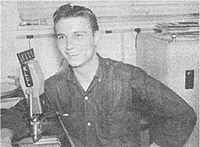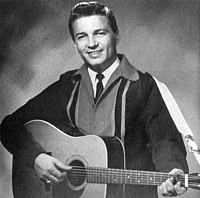Waylon Jennings
Jennings left high school at age sixteen, determined to become a musician, and worked as a performer and DJ on KVOW, KDAV, KYTI, KLLL, in Coolidge, Arizona, and Phoenix.
He appeared in films and television series, including Sesame Street and a stint as the balladeer on The Dukes of Hazzard, composing and singing its theme song and narrating the show.
[6] The Shipley line descended from his great-grandfather, a farmer and lawman from Tennessee, with Jennings adding that "along the way, a lot of Indian blood mixed in," including Cherokee and Comanche families.
[10] Early influences included Bob Wills, Floyd Tillman, Ernest Tubb, Hank Williams, Carl Smith, and Elvis Presley.
[11][12][13][14] Beginning with performing at family gatherings, Jennings played his first public concert at the Youth Center with Anthony Bonanno, followed by appearances at the local Jaycees and Lions Clubs.
[18] The next year he, along with the Texas Longhorns, recorded demo versions of the songs "Stranger in My Home" and "There'll Be a New Day" at KFYO radio in Lubbock.
Corbin was impressed with his voice, and decided to visit Jennings at the station after hearing him sing a jingle to the tune of Hank Snow's "I'm Moving On".
On September 10, Jennings recorded the songs "Jole Blon" and "When Sin Stops (Love Begins)" with Holly and Tommy Allsup on guitars and saxophonist King Curtis.
Jennings stayed at Holly's apartment by Washington Square Park prior to a meeting scheduled at the headquarters of the General Artists Corporation, which organized the tour.
Adding to the problem, the unheated tour buses twice broke down in freezing weather, leading to drummer Carl Bunch being hospitalized for frostbite on his toes.
Following the Clear Lake show (which ended around midnight), Allsup lost a coin toss and gave up his seat on the charter plane to Ritchie Valens, while Jennings voluntarily gave up his seat to J. P. Richardson, known as the Big Bopper, who was suffering from the flu and complaining about how cold and uncomfortable the tour bus was for a man of his size.
"[35] Under 90 minutes later, shortly after 1:00 am on February 3, 1959, Holly's charter plane crashed into a cornfield outside Mason City, instantly killing all on board.
[37] The General Artists Corporation promised to pay for first-class tickets for Jennings and the band to attend Holly's funeral in Lubbock in exchange for them playing that night in Moorhead.
[41] In the early 1960s, Jennings wrote and recorded "The Stage (Stars in Heaven)", a tribute to Valens, the Big Bopper, and Holly, as well as Eddie Cochran, a young musician who died in a road accident a year after the plane crash.
[47] Jennings formed his backing band, the Waylors, with bassist Paul Foster, guitarist Jerry Gropp, and drummer Richie Albright.
[48] The band soon earned a strong local fan base at JD's,[49] where Jennings developed his rock-influenced style of country music that defined him on his later career.
[51] His friend Don Bowman took demos of Jennings to Jerry Moss, who at the time was starting A&M Records with associate Herb Alpert.
He followed up by recording demos of "The Twelfth of Never", "Kisses Sweeter than Wine", and "Don't Think Twice, It's All Right", and also produced the single "Sing the Girls a Song, Bill", backed with "The Race Is On".
[55] Singer Bobby Bare heard Jennings's "Just to Satisfy You" on his car radio while passing through Phoenix, and recorded it and "Four Strong Winds".
After paying for the accommodation and travel expenditures, Jennings was frequently forced to request advances from the agency or RCA Victor to make the next venue.
[79][80] Atlantic Records made a bid to sign Jennings, but Nelson's rise to popularity persuaded RCA to renegotiate with him before losing another potential star.
[86] In 1985, Jennings joined with USA for Africa to record "We Are the World", but he left the studio because of a dispute over the song's lyrics that were to be sung in Swahili.
Jennings's bandmates adorned his guitar with a distinctive leather cover that featured a black background with a white floral work.
Jennings claimed to have spent $1,500 (equivalent to $5,000 in 2023) a day on his habit, draining his personal finances and leaving him bankrupt with debt up to $2.5 million.
[125] Jennings leased a home in the Phoenix area and spent a month detoxing himself, intending to start using cocaine again in a more controlled fashion afterward.
[126] Decades of smoking and drug use took a large toll on Jennings's health in addition to obesity and a poor diet, which resulted in his developing Type 2 diabetes.
[134] In October 2001, Jennings was inducted into the Country Music Hall of Fame, but he was unable to attend the ceremony due to the pain caused by his diabetes.
[136] Jennings's music had an influence on numerous artists,[95] including Hank Williams Jr.,[137] the Marshall Tucker Band,[138] Travis Tritt, Steve Earle, Waylon, Eric Church, Cody Jinks, Jamey Johnson, John Anderson,[139] his son Shooter Jennings, Sturgill Simpson, and Hank Williams III.
Shooter Jennings arranged deals for a clothing line, launched a renewed website, and started talks with different producers on a biographical film.
[144] George Jones' 1985 single "Who's Gonna Fill Their Shoes" references Waylon Jennings with the line, "Like the outlaw who walks through Jessi's dream".










